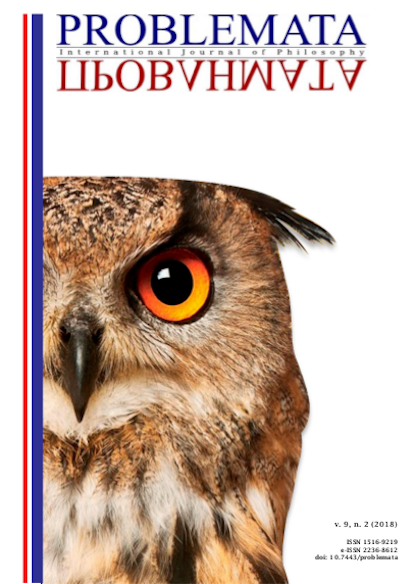RECOGNITION ETHIC REVISITED
DOI:
https://doi.org/10.7443/problemata.v9i2.41248Keywords:
Ethical violence. Critique of normative ethics. Opacity of subject.Abstract
In this article, the idea of ethics of recognition is rethought in order to make possible a proposal: such an idea is an alternative to the ethical violence exercised by the moral discourses that are claimed to be absolute and universal, since these discourses trust and sustain themselves on the rationality of the subject considered free and autonomous. After briefly reviewing the concept of subject, elaborated mainly by Kant, the article analyzes Hegel's recognition and critique of Michel Foucault's notion of subject, but takes as its starting point the perspective of the American philosopher Judith Butler - strongly inspired in the ideas of Adriana Cavarero. For Butler, the question of the moral subject arises when we are called to say who we are, that is, to describe ourselves. Butler's originality is given to the extent that she recognizes that a discourse is never authentic and the subject remains opaque. Rather than being treated as a problem, it is from the apprehension of these epistemological limits that recognition is grounded. But for it to be better presented as an alternative to normative and violent discourses, Butler's ethics of recognition may perhaps be complemented by Foucault's idea of ethics as a critic.
Downloads
References
BUTLER, Judith. Giving an Account of Oneself. Nova Iorque: Fordham University Press, 2005.
FOUCAULT, Michel. A hermenêutica do sujeito. Trad. Márcio Alves da Fonseca e Salma Tannus Muchail. São Paulo: WMF-Martins Fontes, 2010.
Downloads
Published
Issue
Section
License
Authors who publish with this journal agree to the following terms:
- Authors retain copyright and grant the journal right of first publication with the work simultaneously licensed under a Creative Commons Attribution License that allows others to share the work with an acknowledgement of the work's authorship and initial publication in this journal.
- Authors are able to enter into separate, additional contractual arrangements for the non-exclusive distribution of the journal's published version of the work (e.g., post it to an institutional repository or publish it in a book), with an acknowledgement of its initial publication in this journal.
-
- Authors are permitted and encouraged to post their work online (e.g., in institutional repositories or on their website) prior to and during the submission process, as it can lead to productive exchanges, as well as earlier and greater citation of published work (See The Effect of Open Access).





